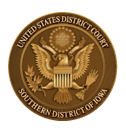In various parts of the United States, including the Southern District of Iowa, citizens are being targeted by telephone calls, emails and fake warrants, threatening them with penalties and possible prosecution for failing to comply with jury service requirements in both federal or state courts.
Common Methods of Fraud
In the calls and emails, recipients are pressured to provide confidential information and data, potentially leading to identity theft and fraud. These calls and emails, which threaten recipients with fines and jail time if they do not comply with demands, are fraudulent and are not connected with the U.S. courts. The caller may even use names listed on websites of current employees to lure you into believing the scam is real and requesting payment of money through bit coin, gift cards, cash or other means. Federal courts do not require anyone to provide any sensitive information in a telephone call or email. Most contact between a federal court and a prospective juror will be through the U.S. mail, and any telephone contact by legitimate court officials will not include requests for Social Security numbers, credit card numbers, or any other personal or financial information.
One tactic is to provide recipients with a fraudulent website that requests private information or payment of a fee. This website may appear legitimate or contain wording often associated with the federal courts. Federal courts will not require the payment of a fee related to jury service. Official juror requests will not include requests for Social Security numbers, driver license information, or financial information.
Another tactic used by this scam is a fraudulent warrant. The description informs the recipient they have a warrant for failure to appear as a material witness and contempt of court. The recipient is directed to pay the fine via kiosks located at various locations worldwide. Once again, the scammer uses current judicial officials to make the warrant appear realistic. Federal law enforcement will never contact a juror by e-mail or phone and request personal information or the payment of a fine.
Persons receiving such telephone calls and emails should not provide the requested information.
Jury duty is a vital civic responsibility and should be taken seriously by all citizens. To verify if a call or mailing related to jury service, including any warrant, came from the U.S. District Court, please call our office directly at (515) 284-6270, during normal business hours, to speak with the Jury Specialist.
Reporting the Attempt
If you have received a suspicious e-mail or phone call, DO NOT give any information. Please report the call to your local FBI Office and file a consumer complaint with the Federal Trade Commission (FTC). The FTC has the ability to detect larger patterns of fraud and share that data with law enforcement.
